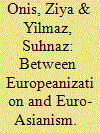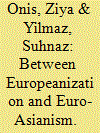| Srl | Item |
| 1 |
ID:
087004


|
|
|
|
|
| Publication |
2009.
|
| Summary/Abstract |
Focusing on Turkish foreign policy in the post-Cold War era, this paper argues that the period can be divided into three distinct phases: an initial wave of foreign policy activism in the immediate post-Cold War context; a new or second wave of foreign policy activism during the Justice and Development Party (Adalet ve Kalk?nma Partisi, AKP) government era with a strong emphasis on Europeanization; and the more recent tension between Europeanization and Euro-Asianism. This paper argues that during the AKP era Turkey maintained considerable continuity in terms of foreign policy activism and a multilateral approach to policymaking. Yet at the same time, a certain discontinuity or rupture can be identified starting in the middle of the first AKP government's reign, signifying a shift from a commitment to deep Europeanization to loose Europeanization along with a parallel shift to a soft Euro-Asianism. Ultimately, the interaction between an intricate set of priorities on the domestic and international fronts will determine the future path of Turkish foreign policy.
|
|
|
|
|
|
|
|
|
|
|
|
|
|
|
|
| 2 |
ID:
087006


|
|
|
|
|
| Publication |
2009.
|
| Summary/Abstract |
Focusing on Turkish foreign policy in the post-Cold War era, this paper argues that the period can be divided into three distinct phases: an initial wave of foreign policy activism in the immediate post-Cold War context; a new or second wave of foreign policy activism during the Justice and Development Party (Adalet ve Kalk?nma Partisi, AKP) government era with a strong emphasis on Europeanization; and the more recent tension between Europeanization and Euro-Asianism. This paper argues that during the AKP era Turkey maintained considerable continuity in terms of foreign policy activism and a multilateral approach to policymaking. Yet at the same time, a certain discontinuity or rupture can be identified starting in the middle of the first AKP government's reign, signifying a shift from a commitment to deep Europeanization to loose Europeanization along with a parallel shift to a soft Euro-Asianism. Ultimately, the interaction between an intricate set of priorities on the domestic and international fronts will determine the future path of Turkish foreign policy.
|
|
|
|
|
|
|
|
|
|
|
|
|
|
|
|
| 3 |
ID:
191807


|
|
|
|
|
| Summary/Abstract |
The process of intensification of authoritarianism in Turkey was characterized by the attempt to monopolize state power and marginalize the opposition. At the same time, however, the intensity of authoritarianism extended beyond the institutional level of the state and decisively affected many levels of social relations. This article analyses one of the many expressions of the relationship between authoritarianism and neoliberalism at social class level and the attempt to construct a disciplined working class committed to the state’s strategies. It focuses on the analysis of the content of ‘desired worker’ and ‘desired trade unionism’ which the AKP government tries to impose, aiming to intensify control over sections of labourers. Analysing the content of social class, but even more specifically the content the government aims to attribute to the concept of working class and trade unionism, this study contributes towards a more general understanding of the development of authoritarianism. Decoding the different perceptions and ways the Erdoğan government exploits them in order to shed them of their class content, this article aims at a better comprehension of power mechanisms and mechanisms reproducing social inequality.
|
|
|
|
|
|
|
|
|
|
|
|
|
|
|
|